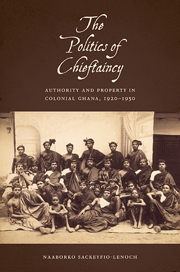Book contents
- Frontmatter
- Dedication
- Contents
- List of Illustrations
- Acknowledgments
- Abbreviations
- Introduction: Contesting Space and Authority in a Colonial Capital
- 1 Situating Ga Institutions in the European Colonial Milieu
- 2 Land Legislation, Commodification, and Effects in Accra
- 3 Negotiating Chieftaincy, the Ga Stool, and Colonial Intervention
- 4 Succession Disputes, the Ga State Council, and the Future of Chieftaincy
- 5 Contesting Property in Accra and Its Periurban Locales
- Conclusion
- Notes
- Bibliography
- Index
Conclusion
Published online by Cambridge University Press: 05 October 2014
- Frontmatter
- Dedication
- Contents
- List of Illustrations
- Acknowledgments
- Abbreviations
- Introduction: Contesting Space and Authority in a Colonial Capital
- 1 Situating Ga Institutions in the European Colonial Milieu
- 2 Land Legislation, Commodification, and Effects in Accra
- 3 Negotiating Chieftaincy, the Ga Stool, and Colonial Intervention
- 4 Succession Disputes, the Ga State Council, and the Future of Chieftaincy
- 5 Contesting Property in Accra and Its Periurban Locales
- Conclusion
- Notes
- Bibliography
- Index
Summary
Today most visitors arrive at Accra's shores by plane to find a bustling city with more than four million residents. A building boom of high-rise buildings and new residential communities marks the city. Growing population densities with residents from all over Africa and the world; vibrant cultural, educational, and economic facilities; and the expansion of roads and motorways are all features of Accra's development as a modern African city. This expansion means a continued need for land from indigenous Ga communities. Ga chiefs, family members, individuals, and other “traditional” authorities have benefited from selling land and receiving government compensation for land acquired for public purposes. Property ownership and local authority continue to be highly contested in twenty-first-century Accra. Government control of land markets, urbanization, and internal conflicts over political titles in an increasingly modern city has exacerbated local Ga autonomy.
During the late 1990s the Ga-Dangme Council was created to agitate for better management of local lands. The group included Ga youth, chiefly authorities, Ga lawyers, intellectuals, and concerned citizens. The Ga-Dangme Council contends that particular land laws apply only to Accra and no other city or town in modern Ghana. The council claims that over the past five decades, a number of land laws have been widely abused by government officials, private citizens groups, and individuals. As a result, litigation has proliferated and conflict over land has prevailed. The laws are similar to colonial laws that allowed government officials to acquire any piece of land for “public” purposes and compensate the owners for acquisition.
- Type
- Chapter
- Information
- The Politics of ChieftaincyAuthority and Property in Colonial Ghana, 1920-1950, pp. 167 - 174Publisher: Boydell & BrewerPrint publication year: 2014

